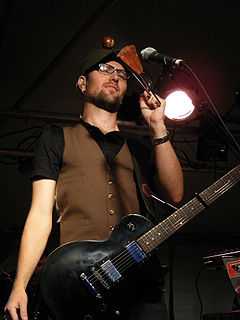Vibraslap
 A Vibraslap manufactured by LP |


A vibraslap is a percussion instrument consisting of a piece of stiff wire (bent into a U-shape) connecting a wood ball to a hollow box of wood with metal “teeth” inside. The percussionist holds the metal wire in one hand and strikes the ball (usually against the palm of their other hand). The box acts as a resonating body for a metal mechanism placed inside with a number of loosely fastened pins or rivets that vibrate and rattle against the box.[1] The instrument is a modern version of the jawbone.
The Vibra-Slap was the first patent granted to the instrument manufacturing company Latin Percussion.[2]
The Vibra-Slap's inventor was Martin Cohen. Cohen was told by percussionist Bob Rosengarden, "If you want to make some money, make a jawbone that doesn’t break." About the inventing process Cohen remembers, "I had never seen a jawbone before, but I had heard one on a Cal Tjader album. I found out that it was an animal skull that you would strike, and the sound would come from the teeth rattling in the loose sockets. So I took that concept and invented the Vibraslap, which was my first patent." [3]
The Vibra-Slap comes in a variety of sizes and materials and is sometimes marketed under the name "Donkey Call" or "Rattleslap."
It can be heard on famous rock songs like "Crazy Train" by Ozzy Osbourne, "Sweet Emotion" by Aerosmith, "Feelin' Alright" by Joe Cocker, and is used often by the band Cake. It can be heard on the 1967 US No. 1 hit single "Green Tambourine" by the The Lemon Pipers.
 |
Sound of a vibraslap
Sound of LP Vibraslap
|
| Problems playing this file? See media help. | |
 |
Another play
Sound of LP Vibraslap
|
| Problems playing this file? See media help. | |
References
- ↑ "Vibra-Slap", Music.VT.edu. URL last accessed December 11, 2009.
- ↑ "LP Vibra-Slap II - Standard Wood (LP208)", SteveWeissMusic.com. URL last accessed December 11, 2009.
- ↑ "PASIC 2012", PAS.org. URL last accessed December 11, 2009.
| Wikimedia Commons has media related to Vibraslap. |
| |||||||||||||||||||||||